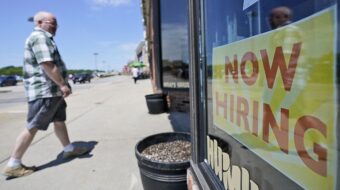News Analysis
The Bolivian government of President Evo Morales has dealt with recent challenges handily. As a result, popular support for his policies is growing, and the prospects for further advances in a progressive and revolutionary direction are strong.
Despite persisting separatist agitation in Bolivia’s wealthy eastern states, procedural conflicts plaguing the country’s Constituent Assembly, and a short-lived coup attempt in mid-October, approval ratings for Morales are up.
Polling carried out over Oct. 31-Nov. 1 gave him a 63 percent level of support, with 55 percent of potential voters confident that the country “is heading in the right direction.” Morales won the presidency a year ago with a 54 percent plurality.
The boost in public approval stems from at least two recent successes, observers say.
In September, an armed conflict developed in Huanuni, in Bolivia’s south, between state-employed tin miners and those working for private mining cooperatives. The death toll was 16; many more were wounded.
Government representatives met with the combatants and made plans to nationalize the tin, gold, and silver mines gradually over two years. Speaking Oct. 31 in the mining district, Morales announced plans to form the Mining Corporation of Bolivia, provide immediate social services for the miners, and recruit up to 4,000 Huanuni miners into the union of state-employed miners.
The second success took place on Oct. 28-29, when Morales signed agreements with 10 foreign oil and gas companies to nationalize the nation’s hydrocarbon resources, thereby making good on his May Day promise. Since then, polling estimates of popular approval for Morales’ program for nationalizing natural gas and oil have ranged from 83 percent to 87 percent.
Buoyed by popular backing, the government, identified with the Movement toward Socialism Party, seems to have enough breathing space to allow for the review of longer-term issues and political strategy.
The revolutionary content of the process unfolding in Bolivia became clear at the “First Meeting of Peoples and States for Liberation of the Great Country” held Oct. 27-29 in Sucre, Bolivia’s historic capital city. The “Great Country” refers to a unified and sovereign South America, the vision of 19th-century independence leader Simon Bolivar.
Over 1,000 delegates from 14 countries were on hand as representatives of social, cultural, indigenous and political movements. Their job, according to a government spokesperson, was to establish the means of communication needed for reaching three basic goals: Latin American integration, unification of the social movements into a “regional block of popular power,” and the enhancement of participatory democracy.
The conference included panels on agrarian reform, financial institutions, state backing for small businesses, environmental protection, education, health care and respect for cultural traditions.
The meeting was seen as a forerunner for two other gatherings, each set to run simultaneously in Cochabamba, Bolivia, on Dec. 8-9. One will be the South American Summit of Presidents. The other will be the Social Summit for the Integration of the Peoples, which will likely play out as a continuation of the October meeting in Sucre.
The conference-goers in Sucre urged that the 12 presidents attending the Cochabamba summit discuss foreign debt repayments, the proliferation of U.S. military bases, planning for industrial and rural revitalization, and “civic-military defense of the Great Country.”
Additional topics of both conferences will include energy, migration, social and labor rights, food sovereignty, water, biodiversity, indigenous peoples and intellectual property.
Some organizers envision an overlap between the two meetings that will strengthen working alliances between political officials and social movements. That confluence, one observer hopefully suggested, may add up to a “new Latin American vanguard” for liberating the oppressed from “homegrown oligarchs and imperialism.”
Bolivian Vice President Alvaro Garcia Linera closed the gathering at Sucre Oct. 29 with a remarkable speech. To fight the “free trade” and privatization policies associated with neoliberalism, he said, is to build socialism, 21st-century style. That process involves also the consolidation of social movements, peasant-indigenous unity, re-appropriation of collective wealth and organizing workers where they live.
Latin America, Garcia suggested, is the prime locus for fashioning the alternative to neoliberalism.
atwhit @ megalink.net

MOST POPULAR TODAY

‘Warning! This product supports genocide’: Michigan group aims to educate consumers

After months of denial, U.S. admits to running Ukraine biolabs

“Trail of Tears Walk” commemorates Native Americans’ forced removal

Hold the communism, please: SFMOMA’s Diego Rivera exhibit downplays artist’s radical politics






Comments